dashboard Citroen BERLINGO MULTISPACE 2015 2.G Owner's Manual
[x] Cancel search | Manufacturer: CITROEN, Model Year: 2015, Model line: BERLINGO MULTISPACE, Model: Citroen BERLINGO MULTISPACE 2015 2.GPages: 298, PDF Size: 12.69 MB
Page 10 of 298
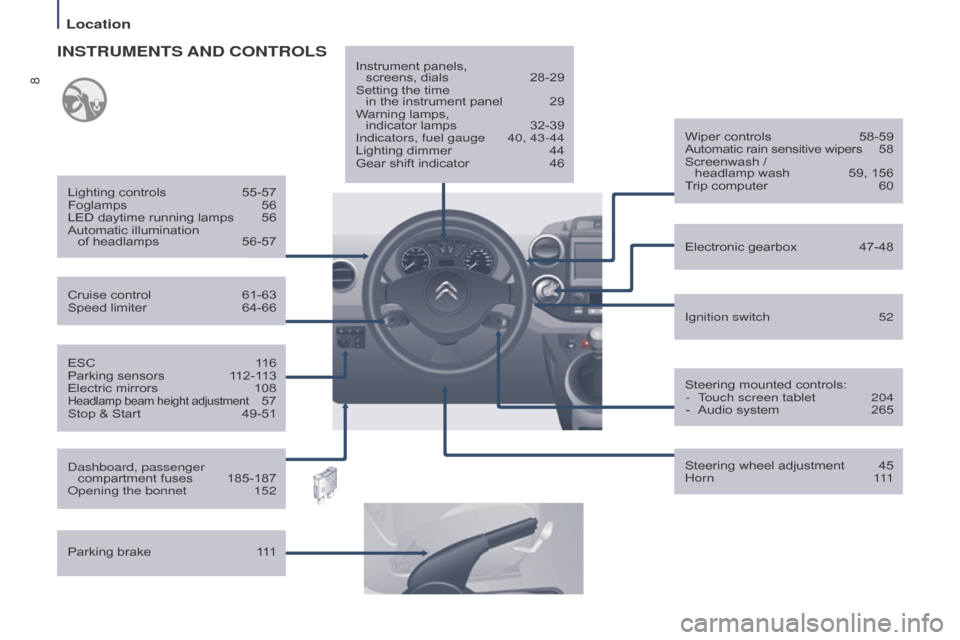
8
Berlingo-2-VP_en_Chap01_vue-ensemble_ed01-2015
ESC 116
Parking sensors 1 12-113
Electric
mirrors
108Headlamp beam height adjustment 57
Stop
&
Start
49-51
Cruise
control
61-63
Speed
limiter
64-66
Lighting
controls
55-57
Foglamps
56
LED
daytime
running
lamps
56
Automatic
illumination
of
headlamps
56-57
INSTRUMENTS AND
CONTROLS
dashboard, passenger
compartment fuses 185-187o
pening the bonnet
152
Parking
brake
1
11Instrument
panels,
screens, dials
28-29
Setting
the time
in the instrument panel
29
W
arning lamps,
indicator lamps
32-39
Indicators, fuel gauge
40, 43-44
Lighting
dimmer
44
Gear
shift indicator
46
Wiper
controls
58-59
Automatic
rain sensitive wipers
5
8
Screenwash /
headlamp wash
59,
156
Trip computer
60
Steering
wheel adjustment 45
Horn 1 11
Ignition switch
52
Electronic
gearbox
47-48
Steering
mounted controls:
-
T
ouch screen tablet
204
-
Audio
system
265
Location
Page 13 of 298
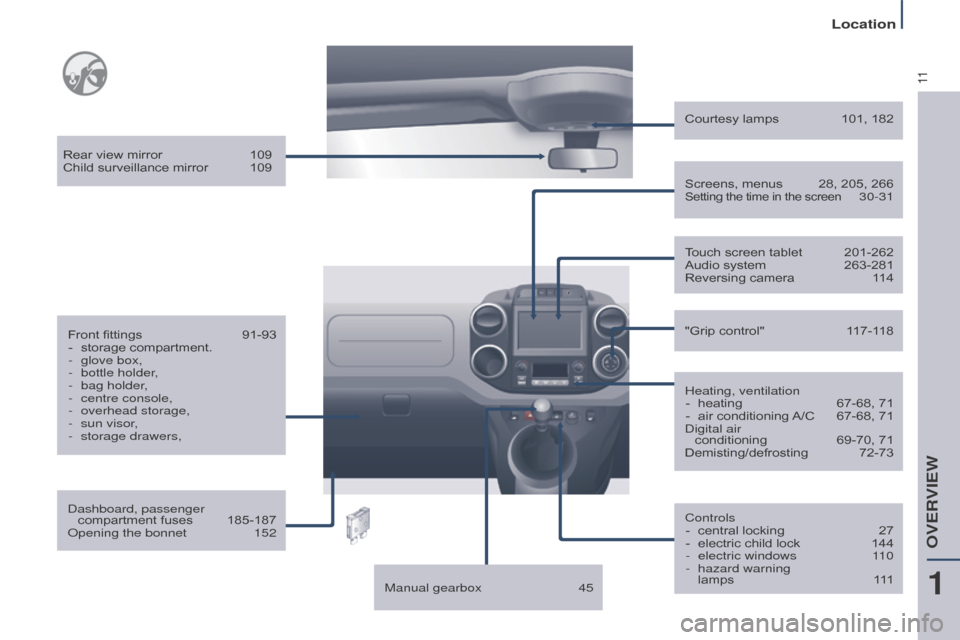
11
Berlingo-2-VP_en_Chap01_vue-ensemble_ed01-2015
dashboard, passenger compartment fuses 185-187o
pening the bonnet
152
Front
fittings
91-93
-
storage
compartment.
-
glove box,
-
bottle holder
,
-
bag holder
,
-
centre console,
-
overhead storage,
-
sun visor
,
-
storage drawers,
Rear
view mirror
109
Child
surveillance mirror
109
Manual gearbox
45T
ouch screen tablet
201-262
Audio
system
263-281
Reversing
camera
1
14
Controls -
central
locking
27
-
electric
child lock
144
-
electric windows
1
10
-
hazard warning
lamps
1
11
"Grip
control"
1
17-118
Heating, ventilation -
heating
67-68,
71
-
air
conditioning
A/C
67-68,
71
d
igital air
conditioning
69-70,
71
Demisting/defrosting
72-73
Courtesy
lamps
101,
182
Screens, menus
28,
205, 266
Setting the time in the screen 30-31
1
oVERVIEW
Location
Page 29 of 298
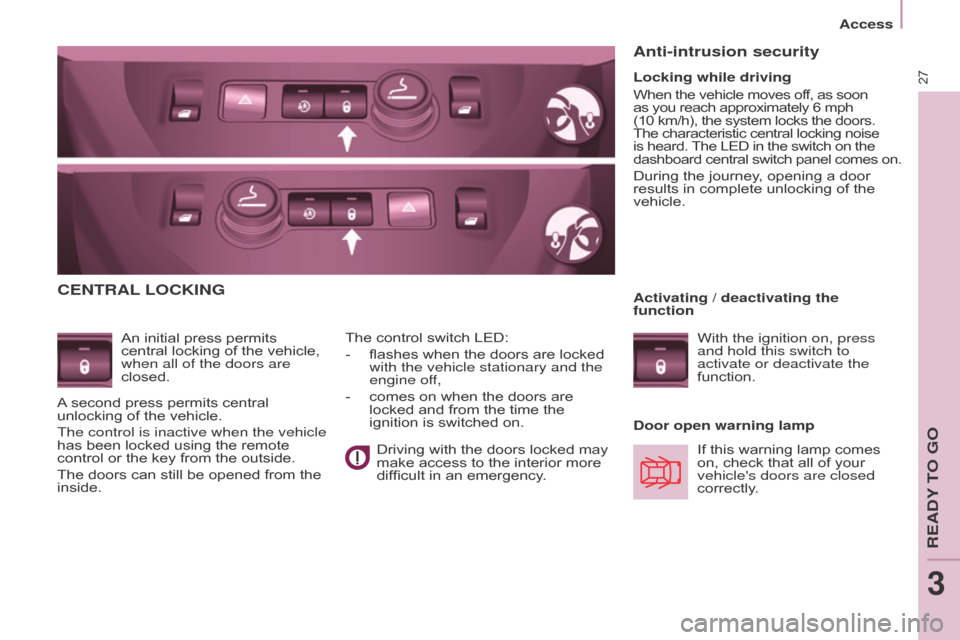
27
Berlingo-2-VP_en_Chap03_Pret-a-partir_ed01-2015
CENTRAL LOCKING
An initial press permits central
locking of the vehicle,
when all of the doors are
closed.
Door open warning lamp
The
control switch LED:
-
flashes
when the doors are locked
with the vehicle stationary and the
engine of
f,
-
comes
on when the doors are
locked
and from the time the
ignition
is switched on.
Anti-intrusion security
If this warning lamp comes on, check that all of your
vehicle's doors are closed
correctly
.
Locking while driving
When the vehicle moves off, as soon as
you reach approximately 6 mph (10 km/h),
the system locks the doors.
The
characteristic central locking noise
is
heard.
The
LED in the switch on the
dashboard
central switch panel comes on.
During the journey, opening a door results in complete unlocking of the
vehicle.
Activating / deactivating the
function
With the ignition on, press
and hold this switch to
activate or deactivate the
function.
Driving
with
the
doors
locked
may
make
access
to
the
interior
more
difficult
in
an
emergency.
A
second
press
permits
central
unlocking
of
the
vehicle.
The control is inactive when the vehicle
has
been
locked
using
the
remote
control
or
the
key
from
the
outside.
The
doors
can
still
be
opened
from
the
inside.
access
REadY To Go
3
Page 71 of 298
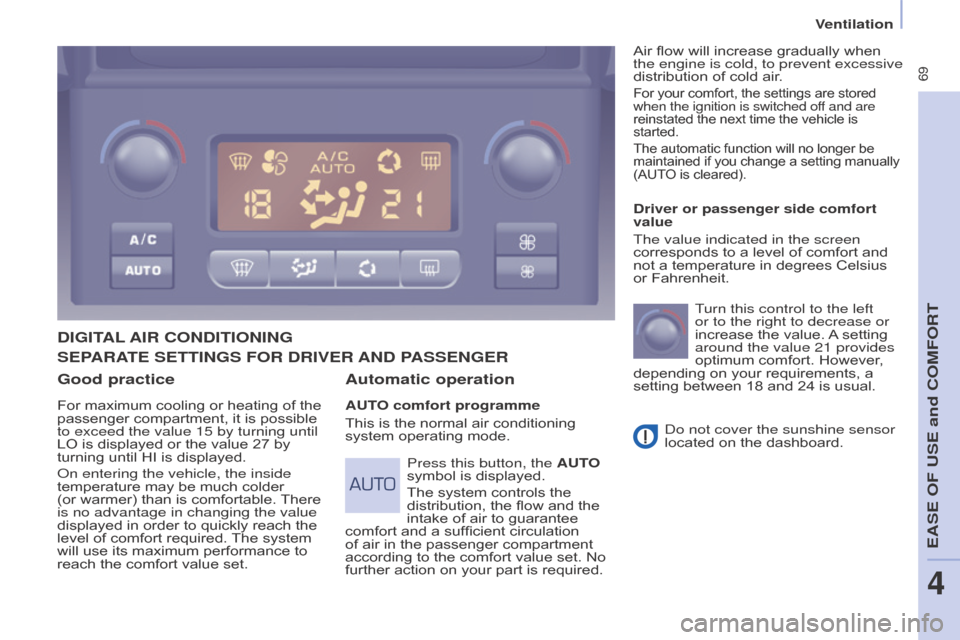
69
Berlingo-2-VP_en_Chap04_Ergonomie_ed01-2015Berlingo-2-VP_en_Chap04_Ergonomie_ed01-2015
Good practice
For maximum cooling or heating of the passenger compartment, it is possible
to exceed the value 15 by turning until
LO
is displayed or the value 27 by
turning
until HI is displayed.
o
n entering the vehicle, the inside
temperature
may be much colder
(or
warmer) than is comfortable.
There
is no advantage in changing the value
displayed
in order to quickly reach the
level
of comfort required.
The
system
will
use its maximum performance to
reach
the comfort value set.
DIGITAL AIR CONDITIONING
Automatic operation
AUTO comfort programme
This
is the normal air conditioning
system
operating mode. Driver or passenger side comfort
value
The value indicated in the screen
corresponds
to a level of comfort and
not
a temperature in degrees Celsius
or
Fahrenheit.
Turn this control to the left
or to the right to decrease or
increase the value.
A
setting
around the value 21 provides
optimum
comfort. However,
depending
on your requirements, a
setting
between 18 and 24 is usual.
d
o not cover the sunshine sensor
located
on the dashboard.
Press this button, the AUTO
symbol
is displayed.
The
system controls the
distribution,
the flow and the
intake
of air to guarantee
comfort
and a sufficient circulation
of
air in the passenger compartment
according
to the comfort value set. No
further
action on your part is required.Air
flow will increase gradually when
the
engine is cold, to prevent excessive
distribution of cold air.
For your comfort, the settings are stored when the ignition is switched of
f and are
reinstated
the next time the vehicle is
started.
The
automatic function will no longer be
maintained
if you change a setting manually
(AUT
O is cleared).
SEPARATE SETTINGS FOR DRIVER AND PASSENGER
EASE OF USE and COMFORT
4
Ventilation
Page 93 of 298

91
Berlingo-2-VP_en_Chap04_Ergonomie_ed01-2015Berlingo-2-VP_en_Chap04_Ergonomie_ed01-2015
FRONT FITTINGS
1. Lower glove box
This may or may not be fitted with a lid.
Upper storage compartment
This is located on the dashboard,
behind the steering wheel.
A
recess makes lifting of the lid easier
when
opening. Guide it to its rest
position.
T
o close, guide the lid then press the
centre
gently.
Any
liquid which could spill risks
causing an electrical short circuit and
therefore
a potential fire.
3. Side storage compartment
4. Bag hook
Only hang flexible bags which are not too heavy on this hook.
2. Storage pocket and bottle
holder (1.5 L)
EASE OF USE and COMFORT
4
Practical information
Page 113 of 298

111
Berlingo-2-VP_en_Chap05_Securite_ed01-2015
HAZARD WARNING LAMPS
H
ORN
Press the centre of the steering wheel.
PARKING BRAKE
Applying
Pull the parking brake lever up to immobilise
your vehicle.
Check
that the parking brake is applied
firmly
before leaving the vehicle.Pull
on the parking brake lever, only
with the vehicle stationary.
In the exceptional case of use of the
parking
brake when the vehicle is
moving,
apply the brake by pulling
gently
to avoid locking the rear wheels
(risk
of skidding).
Press this button, the direction
indicators
flash.
They
can
operate
with
the
ignition
off.
The
hazard
warning
lamps
should
only
be used in dangerous situations, when
stopping
in
an
emergency
or
when
driving
in
unusual
conditions.
When
parking on a slope, direct your
wheels
towards the pavement and pull
the
parking brake lever up.
There is no advantage in engaging
a
gear after parking the vehicle,
particularly
if the vehicle is loaded.
If the parking brake is still on or has not been released properly, this is
indicated
by this warning lamp which
comes
on on the instrument panel.
Automatic operation of hazard
warning lamps
When braking in an emergency, depending on the force of deceleration,
the hazard warning lamps come
on
automatically.
They
switch off
automatically
the first time you
accelerate.
It
is also possible to switch them off by
pressing
the switch on the dashboard.Releasing
Pull the lever up slightly and press the
button to lower the parking brake lever.
driving safely
SaFETY
5
Page 129 of 298
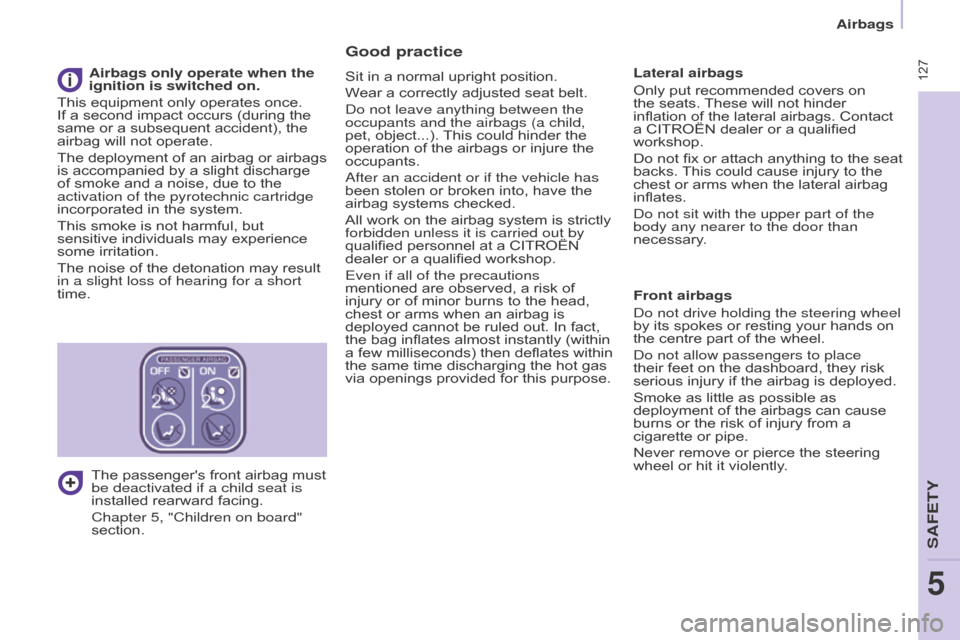
Berlingo-2-VP_en_Chap05_Securite_ed01-2015
127
Good practice
Sit in a normal upright position.
W ear a correctly adjusted seat belt.
d
o not leave anything between the
occupants and the airbags (a child,
pet,
object...).
This
could hinder the
operation
of the airbags or injure the
occupants.
a
fter an accident or if the vehicle has
been
stolen or broken into, have the
airbag
systems checked.
All
work on the airbag system is strictly
forbidden unless it is carried out by
qualified
personnel at a CITROËN
dealer
or a qualified workshop.
Even if all of the precautions
mentioned
are observed, a risk of
injury
or of minor burns to the head,
chest
or arms when an airbag is
deployed
cannot be ruled out. In fact,
the
bag inflates almost instantly (within
a
few milliseconds) then deflates within
the
same time discharging the hot gas
via
openings provided for this purpose.Lateral airbags
Only
put recommended covers on
the
seats.
These
will not hinder
inflation
of the lateral airbags. Contact
a
CITROËN dealer or a qualified
workshop.
Do
not fix or attach anything to the seat
backs.
This
could cause injury to the
chest
or arms when the lateral airbag
inflates.
d
o not sit with the upper part of the
body any nearer to the door than
necessary.
Front airbags
d
o not drive holding the steering wheel
by
its spokes or resting your hands on
the
centre part of the wheel.
d
o not allow passengers to place
their
feet on the dashboard, they risk
serious
injury if the airbag is deployed.
Smoke
as little as possible as
deployment
of the airbags can cause
burns
or the risk of injury from a
cigarette
or pipe.
Never
remove or pierce the steering
wheel
or hit it violently.
Airbags only operate when the
ignition is switched on.
This
equipment
only
operates
once.
If
a
second
impact
occurs
(during
the
same
or
a
subsequent
accident),
the
airbag
will
not
operate.
The
deployment
of
an
airbag
or
airbags
is
accompanied
by
a
slight
discharge
of
smoke
and
a
noise,
due
to
the
activation of the pyrotechnic cartridge
incorporated
in
the
system.
This
smoke
is
not
harmful,
but
sensitive
individuals
may
experience
some
irritation.
The
noise
of
the
detonation
may
result
in a slight loss of hearing for a short
time. The
passenger's
front
airbag
must
be deactivated if a child seat is
installed
rearward
facing.
Chapter 5, "Children on board"
section.
airbags
SaFETY
5
Page 131 of 298
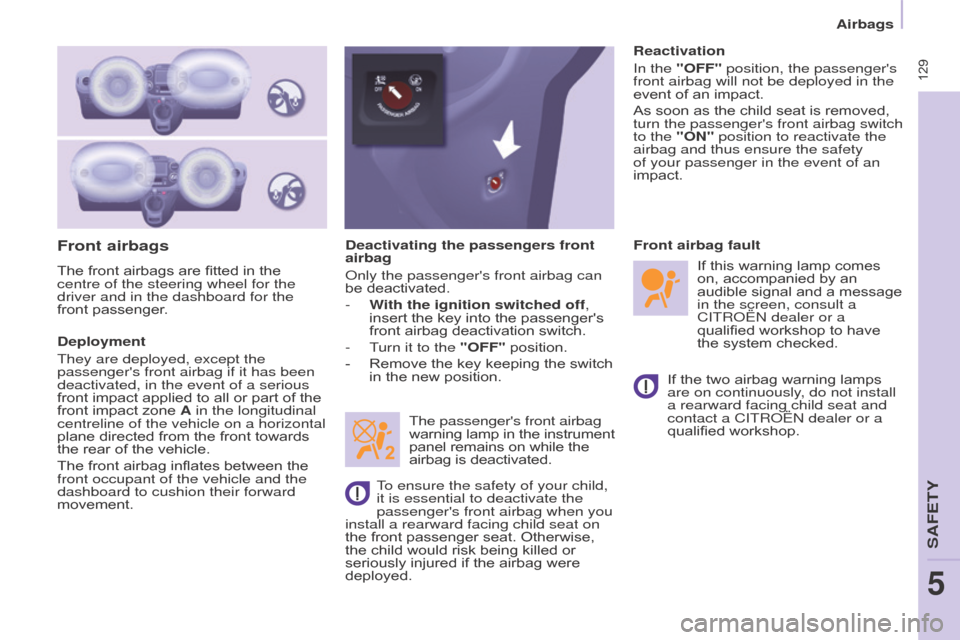
Berlingo-2-VP_en_Chap05_Securite_ed01-2015
129
Front airbags
Deployment
They are deployed, except the
passenger's front airbag if it has been
deactivated, in the event of a serious
front impact applied to all or part of the
front
impact zone A in the longitudinal
centreline of the vehicle on a horizontal
plane
directed from the front towards
the
rear of the vehicle.
The
front airbag inflates between the
front occupant of the vehicle and the
dashboard to cushion their forward
movement. Deactivating the passengers front
airbag
o
nly the passenger's front airbag can
be deactivated.
-
W
ith the ignition switched off,
insert the key into the passenger's front
airbag deactivation switch.
- T urn it to the "OFF" position.
-
Remove
the key keeping the switch
in
the new position.
The passenger's front airbag
warning
lamp
in
the
instrument panel
remains on while the
airbag
is deactivated.If
the two airbag warning lamps
are on continuously
, do not install
a rearward facing child seat and
contact a CITR
o Ë n dealer or a
qualified
workshop.
Front airbag fault
To ensure the safety of your child,
it is essential to deactivate the
passenger's front airbag when you
install a rearward facing child seat on
the
front passenger seat. Otherwise,
the
child would risk being killed or
seriously
injured if the airbag were
deployed.Reactivation
In the
"OFF" position, the passenger's
front airbag will not be deployed in the
event of an impact.
As soon as the child seat is removed,
turn the passenger's front airbag switch
to the
"ON" position to reactivate the
airbag and thus ensure the safety
of your passenger in the event of an
impact.
If this warning lamp comes
on,
accompanied by an
audible
signal and a message
in the screen, consult a
CITR
o Ë n dealer or a
qualified workshop to have the
system checked.
The
front airbags are fitted in the
centre of the steering wheel for the
driver and in the dashboard for the
front
passenger.
airbags
SaFETY
5
Page 146 of 298

Berlingo-2-VP_en_Chap05_Securite_ed01-2015
144
CHILD LOCK
This prevents opening of the siding
side doors from the inside.
Manual Electric
With the ignition on, press
this
button in the middle of
the
dashboard.
Indicator
lamp on = child lock
on.
Please
note: this system is
independent
of the central locking
control.Always
remove the ignition key
when leaving the vehicle, even for
a
short time.
It
is
advisable to check the state of
the
child
lock each time the ignition is
switched
on.
In
the
event of a serious impact the
electric
child lock is deactivated
automatically
.
a label indicates the position of the
lever
and
the
state
of
the
child
lock.
-
o
pen fully past the point of
resistance.
-
T
ilt the lever, located on the rear
section
of
the
door.
Child safety
Page 154 of 298
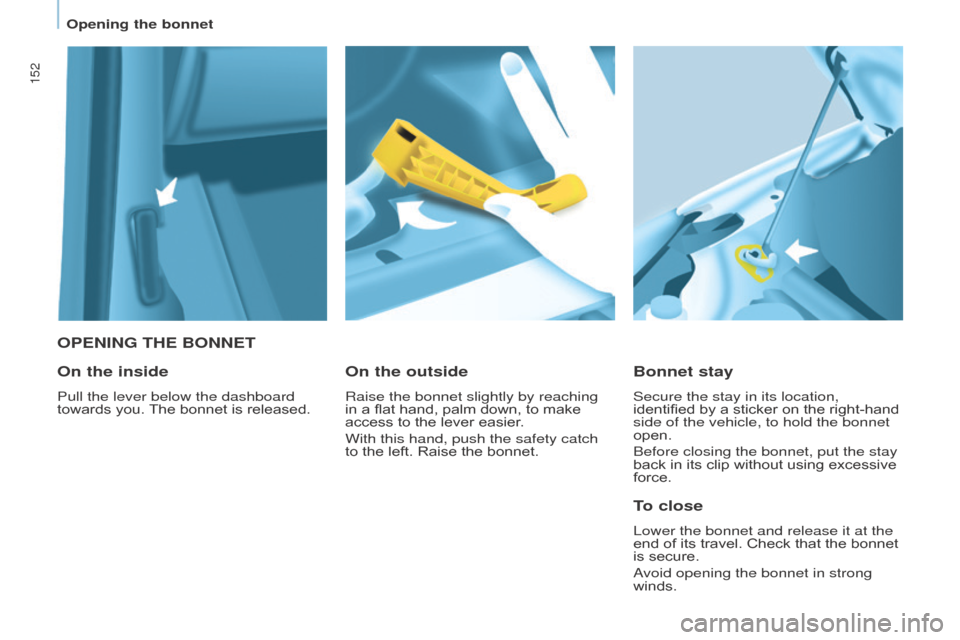
152
Berlingo-2-VP_en_Chap07_Verification_ed01-2015
OPENING THE BONNET
Bonnet stay
Secure the stay in its location,
identified by a sticker on the right-hand
side of the vehicle, to hold the bonnet
open.
Before closing the bonnet, put the stay
back
in its clip without using excessive
force.
On the outside
Raise the bonnet slightly by reaching
in a flat hand, palm down, to make
access
to the lever easier.
With this hand, push the safety catch
to
the left. Raise the bonnet.
On the inside
Pull the lever below the dashboard
towards you. The bonnet is released.
To close
Lower the bonnet and release it at the
end of its travel. Check that the bonnet
is
secure.
avoid opening the bonnet in strong
winds.
opening the bonnet